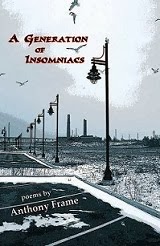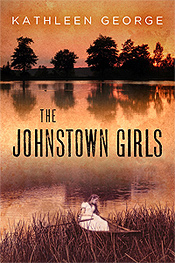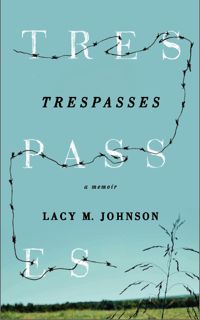
One of the first poems in the collection, "How to Write a Poem in Toledo, Ohio" serves as a perfect prelude to the collection. In this poem, Frame writes, "Start with the churches, those brilliant buildings/standing at the center of every neighborhood." From these first two lines, he moves forward, giving precise directions for writing about a place including citing specific actions: "Learn how/to hop fences as a child. As an adult//learn how to hop curbs in your 4x4." He ends with this piece of advice: "If you manage//to leave, don't forget your blue collar genes." After all, he explains, "Here, we fray. Here, we rust. Remember that."
Certainly, the pictures of a frayed and rusted narrator follows the reader throughout the collection, as many of the poems focus on the stark images of a time period filled with tension and loss. The collection weaves in and out of personal history that often reflects both local place and the world at large. Some poems focus on memory such as "Hate" which depicts a scuffle between two boys that ends with physical pain and injury and a narrator who says, "This city has more hate than broken windows." In another poem, "Why I Hate the Sunrise," the narrator thinks back to his perception of war as a memory of a teacher who wheels a television to her classroom to show "A green sun exploding over the darkened sky/ of Baghdad, surrounded by cascading comets."
Still, most of the poems take on a more lyrical, instead of narrative voice, often mourning different losses. The time period of this collection focuses on the early 1990's and the poem, "Are You Ready" finds a group of friends toasting the new millennial with the narrator cataloging their futures -- futures he cannot yet know: "Greg will get kicked out of Iraq for loving/a man. He'll move to Maine/hiding himself/among snow and foster children./Eric will find salvation in a church run//by a schizophrenic Christ, the rapture always/ almost here. Jason will lose himself somewhere/on the fringes of Route 66. The Pacific Ocean/forever a fantasy, he'll come back to Ohio//and die slowly, woken at night by cancer scars/and seizures." Indeed, several works in this collection are dedicated to Jason including the poem, "Heart-Shaped State" that explains, "Jason's cancer grew from/his skin towards his lymph nodes. We should have seen/the danger of sun and bare skin, but we knew//albinos die first in nature."
As with many collections that focus on elegies, A Generation of Insomniacs also finds the narrator of these poems fighting losses about himself. In "Evolution," he depicts his own grief about the departure of a friend: "As you cry, I stand and search this secret crowd/for a space to remain a man." In another poem titled "Last Night of Childhood, Nearly Thirteen," the narrator laments the loss of youth when he returns "to the boy in the green bedroom/his name scribbled on the door above a series/of inches and dates." Yet, Frame's work is not without hope. Several poems celebrate hope in the face of loss including the concluding poem, "Flannel Love Poem With a Touch of Sky" where the narrator addresses his love: "I pull into our driveway, the sun/soon to rise. In front of me, the living room lamp/you left on all night to guide me home./Above me, the stars and the spring breeze/dancing with the bedroom window. And you, love--/wearing my old Nirvana shirt as a nightgown."
For more information, see Frame's website or visiting Main Street Rag, the publisher of A Generation of Insomniacs.


 RSS Feed
RSS Feed
